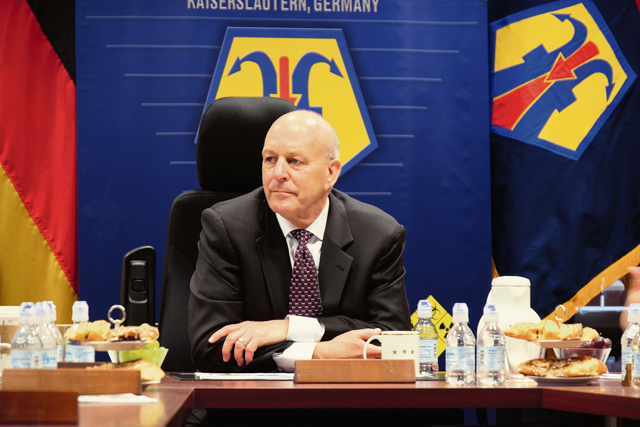
Retired Navy Vice Adm. Michael LeFever receives a 7th Mission Support Command brief from 7th MSC senior leaders, including James Otto, 7th MSC command executive officer, March 4 during his visit to 7th MSC headquarters. LeFever also shared his experience in humanitarian assistance and disaster response and partnership development.
A retired vice admiral with extensive experience in humanitarian assistance and disaster relief operations visited the 7th Mission Support Command March 11.
Retired Navy Vice Adm. Michael A. LeFever will be the senior mentor during the 7th MSC’s upcoming annual training exercise, Anakonda Response, in April. The exercise simulates a U.S. response to a catastrophic flooding event.
“I’m looking forward to getting to know you and working with you on this exercise,” LeFever told the Soldiers and civilians of the 7th MSC during a town hall-style discussion.
LeFever was in charge of the U.S. military’s response to two natural disasters in Pakistan.
In 2005 and 2006, LeFever was assigned as commander of the Disaster Assistance Center, Pakistan, to coordinate U.S. military assistance during a devastating earthquake.
The four-minute event registered a magnitude of 7.6, displaced 3.5 million people, and killed nearly 75,000 in Pakistan and India, LeFever said.
In 2010, as the senior defense representative at the U.S. Embassy in Islamabad, LeFever led the U.S. military response to the catastrophic flooding of the Indus River, which submerged one-fifth of the country, damaged or destroyed 1.2 million homes, and affected 17 million people.
While conducting these disaster responses, LeFever had to come up with innovative solutions with no precedent, said Command Sgt. Maj. James Murrin, 7th MSC senior enlisted leader.
“He’s got the experience when it comes to doctrine but completely understands that doctrine is just a guide, not a limiting factor,” Murrin said. “It wasn’t easy, but he was able to make it work.”
As senior mentor, LeFever will be working directly with Brig. Gen. Arlan DeBlieck, 7th MSC commanding general, but the whole command will benefit from his experience, said Lt. Col. Lance Oliver, the exercise planner.
“He will help us inject some realism into the CPX (Command Post Exercise) scenario and correct our assumptions based on his past experience,” Oliver said.
During LeFever’s visit, the 7th MSC staff briefed him about the command and the upcoming exercise. LeFever also took time to speak to the Soldiers and civilians about his experiences in Pakistan.
“The key to a humanitarian operation is trying to get the population back to normalcy as quickly as you can,” LeFever said.
With disasters of this magnitude, it is essential to put aside personal and organizational ego and work to get the job done, LeFever said. The trust that relationships bring is essential to getting the job done.
“I tell everybody that my priority was relationships, relationships, relationships, in that order,” LeFever said.
A successful response builds credibility and deepens personal relationships, LeFever said. It also demonstrates good will and commitment and shows strategic impact with U.S. enablers.
Despite the challenges, LeFever lists the HA-DR efforts as his career highlight.
Being personally responsible for helping so many people is an incredibly powerful experience, LeFever said.
“Once you do this mission, it gets in your blood,” LeFever added. “There’s nothing like it.”


